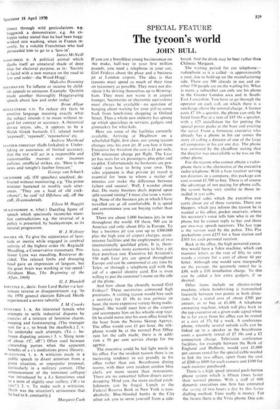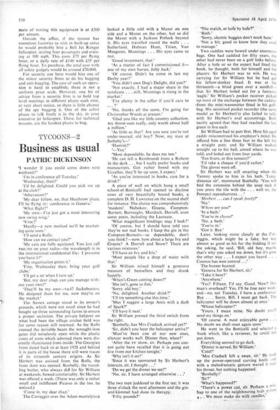SPECIAL FEATURE
The tycoon's world
JOHN BULL
If you are a breathless young businessman on the make, half-way to your first million pounds, you need a telephone in your car, Girl Fridays about the place and a business jet at London airport. The idea is that tycoons must spend as much of their time on tycoonery as possible. They must not dis- sipate it by driving themselves up to Birming- ham. They must not waste it in airport lounges. Secretaries or electronic equivalents must always be available—no question of hanging about waiting for your girl to come back from lunch-time shopping in Oxford Street. Thus a whole new industry has sprung up which specialises in services, gadgets and gimmickry for whiz-kids.
Here are some of the facilities currently available. Arriving at Heathrow on a scheduled flight, first class, our young tycoon changes into his own jet. If you hire it from Executive Jet Aviation the cost is £1 per mile, 1200 minimum charge per flight. The Lear jet has seats for six passengers, plus pilot and co-pilot. Unfortunately no hostesses are pro- vided—you have to bring your own. The sales argument is that private jet travel is essential for 'men to whom a matter of minutes car make the difference between failure and success'. Well, I wonder about that. Do many business deals depend upon split-second timing? I must also issue a warn- ing. None of the business jets in which I have travelled are at all comfortable. It is speed and convenience you are buying rather than luxury.
There are about 1,000 business jets in use throughout the world. Of these, 900 are in America and only about fifty in Europe. To buy a business jet can cost up to /300,000 plus the high cost of airport charges, main- tenance facilities and the employment of two internationally qualified pilots. It is, there- fore, sometimes more economic to hire a jet than purchase one. Executive Jet Aviation's 550 mph Lear jets are spread throughout Europe and can be summoned at any time by Telex, or through a telephone call with the aid of a special identity card. E1A is even willing to put the customer's name on the side of the plane.
And how about the absurdly named Girl Fridays? These secretaries command high premiums. A visiting tycoon would hire such a secretary for £1 lOs to two guineas an hour, the more expensive variety being multi- lingual. She would meet him at the airport and accompany him on his whistle-stop tour. Or he could move into his own office hired by the hour from the Norma Skemp Agency. The office would cost £1 per hour, the tele- phone would be at the normal Post Office rate for the calls made; there is in addi- tion a 50 per cent service charge for the agency.
The executive could be fed light meals in his office. For the resident tycoon there is an increasing tendency to eat grandly in his office rather than out. Boardroom dining rooms, with their own resident cordon bleu chefs, are more secure than restaurants. There are no unwanted fellow-diners eaves- dropping. Mind you, the more exalted estab- lishments can be frugal. Lunch at the Federal Reserve Bank in New York is non- alcoholic. Blue-blooded banks in the City often ask you to serve yourself from a side-
board. And the drink may be beer rather than Chateau Margaux.
The waiting period for car telephone— radiophone as it is called—is approximately a year, due to hold-up on the manufacturing side. There are 300 already in use and an- other 550 people are on the waiting list. What is more, a subscriber can only use his phone in the Greater London area and in South- East Lancashire. You have to go through the operator on each call, on which there is a • surcharge above the normal charge. A licence costs £7 lOs a quarter, the phone can only be hired from Pye at a rent of 145 16s a quarter, with a £25 installation fee for putting the special power packs in the boot and erecting the aerial. From a fortunate executive who already has a phone in his car comes the story of calling a director of one of the large oil companies in his car one day. The phone was answered by the chauffeur stating that the director was unavailable as he was on the other phone.
For the tycoon who cannot obtain a radio- phone there is the alternative of the executive radio telephone. With a base receiver serving ten directors in a company, this package can cost around £1,700 to buy. There is of course the advantage of not paying for phone calls, the system being very similar to those in- stalled in taxi cabs.
Personal aides which the executive can carry about are of three varieties. There are bleepers, which just inform the tycoon he is wanted at his office, pocket receivers, where his secretary's voice tells him who is on the phone but he cannot reply to her and there are two-way speech receivers. The last type is the version used by the police. This Pye pocketfone costs £235 for a base station and £103 'for each personal receiver.
Back in the office, the high powered execu- tive would have a Telex machine, which can transmit letters at the rate of fifty to sixty words a minute for a cost of about 4d per letter. Although one would save marginally on the postage. the quarterly rental fee is £40, with a /10 installation charge. To this can be added a few extra gadgets, if so desired.
Other items include an electro-writer machine, where handwriting is transmitted fascimile between two points in both direc- tions for a rental cost of about £300 per annum, or to buy at £1,400. A telephone answering machine, which will play back to the top executive on a given code signal when he is far away from his office can be rented at a cost of 37s 6d a week. A conference phone, whereby several outside calls can be linked up to a speaker in the boardroom costs a quarterly rental of £7 lOs and a £2 connection charge. Television conference facilities, for example between the Bank of England and Holborn, would cost £1,000 per annum rental for the special cable needed to fink the two offices, apart from the cost of 1500 to £800 for each camera and £100 for each monitor purchased.
There is a high speed internal push-button phone system which is fifteen times faster than normal phones. With a staff of 600 dynamic executives one firm has estimated the saving of two hours a day by this faster dialling method. Time really is money. For the future there is the Vista phone. One esti-
mate of renting this equipment is at £200 per annum. • Outside the office, if the tycoon has numerous factories to visit in built-up areas he would probably hire a Bell Jet Ranger helicopter, seating four passengers and cruis- ing at 100 mph. This costs £75 per flying hour, or a daily rate of £140 with £35 per flying hour. To purchase, the total cost with all safety gadgets would be around £70,000.
For security our hero would hire one of the minor security firms to do his bugging and anti-bugging. The cost of such an opera- tion is hard to establish; there is not a uniform price scale. However, one bit of advice from a security firm is to hold top level meetings in different places each time, at very short notice, so there is little chance of the spy bugging it. One of the safest places to talk freely is in the sky, in your executive jet helicopter. These, for technical reasons, are the hardest places to bug.







































 Previous page
Previous page